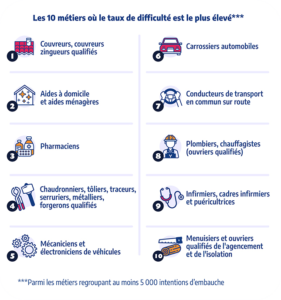
-
Whether it's an increase in activity or the replacement of vacant positions (due to leave or long-term absence, retirement or internal mobility...), all companies need to recruit at one time or another.
Today, however, they are struggling to find candidates, and this trend shows no sign of reversing. In 2022, 58% of recruitments will be considered "difficult" by companies(BMO survey by Pôle emploi and Crédoc).
Some professions are under greater pressure than others, but the shortage is gradually spreading to all sectors of activity. Surveys are multiplying, and all point to a growing trend in this phenomenon. Lack of candidates, unsuitable profiles or unsuccessful recruitments: employers face a number of obstacles.
Long, difficult recruitment processes lead to vacancies, which have a major impact on company performance, particularly in a context of high unemployment.
These are occupations for which companies are looking to hire, but which are experiencing recruitment problems. The term "shortage occupations" refers to the imbalance between job supply and demand. A job is said to be in tension when the number of vacancies to be filled significantly exceeds the number of applications received by employers.
Some sectors, such as construction and public works, personal services and IT, are more affected than others. The pandemic context has undoubtedly aggravated the situation in certain sectors. Nevertheless, according to the DARES (Direction de l'Animation de la Recherche des Études et des Statistiques), the imbalance between job supply and demand already existed before the Covid19 crisis. Indeed, according to one study, tensions on the labor market were already reaching a critical level in 2019.
Which professions will be most concerned in 2022 ?

source : Pôle emploi
Based on the results of the BMO 2022 survey (Pôle emploi and Crédoc), companies explain staff shortages in 86% of cases by a shortage of candidates, or by theunsuitability of candidates'profiles (71%).
Recruiters point out that these unsuitable profiles can be explained by a lack of experience or training, or by insufficient motivation. This lack of motivation does not necessarily reflect a desire not to work. It may also indicate a lack of understanding of the position to be filled, as job offers are often similar without really presenting the day-to-day aspects of the job on offer.
It's important not to confine yourself to the job description, but to give a glimpse of the company, to arouse candidates' curiosity and enable them to see themselves in the company, on the job and within the team already in place.
Still according to the BMO 2022 survey, the recruiters questioned believe that difficulties can also be linked to working conditions (for 33%), the lack of image of the company, profession or sector (for 23%), the lack of financial means (for 17%) oraccess to the workplace (for 15%).
While the lack of applicants for many of the short-staffed professions is mainly due to a lack of training and technical skills, recruitment difficulties are also linked to a lack of image and numerous prejudices. If some of these elements persist, others have been transformed thanks to technological developments, improved industrialization processes or the development of digitalization. It is essential to provide information on these changes.
The major players in the employment sector, such as Pôle emploi, Adecco and the professional federations, are on the alert to meet this recruitment challenge.
New communication channels (social networks, websites, Youtube...), events and trade fairs, as well as work experience placements, are among the most effective ways of informing applicants about their potential future careers. According to the BMO 2022 survey, there will be 180,000 of these in 2021. These are short (unpaid) periods spent in a company, working alongside a practicing professional to learn about the working environment and the skills required for the position.
Although very concrete for jobseekers, these immersions represent a major commitment for the company, reflecting disparities in the capacity to welcome and support immersed employees.
Fortunately, career discovery can also be supported by the latest pedagogical and digital innovations.
Take, for example, Yookan, a third-party space housed in the Westfield Rosny 2 shopping center, which aims to reinvent career guidance and discovery. Whether in the industrial or service sectors, highly operational immersions are deployed: serious games, escape games, virtual reality headsets, conversational experiences...

Another example is the optical sector, which is currently under great pressure. Companies are betting heavily on innovation to attract candidates. This is the case for the GrandVision Group (Générale d'Optique and GrandOptical), which has developed an immersive conversational experience to enhance its employer brand and showcase the different - often little-known - missions within their stores. One of the advantages of these digitized "live my life" experiences is, of course, scale; it's easier to reach a large number of people when the experience is available everywhere (from a computer, tablet or phone).

Of course, job discovery is not the only answer to France's recruitment problems. Questions of training, accessibility, arduous work and wage increases all come into play. Many of the factors behind this phenomenon are difficult to measure and remain mysterious.
Although the daily lives of many companies are disrupted, 9 out of 10 new hires are successful.
Nevertheless, there is real added value in pooling these business discovery processes. Major players in the employment sector, professional federations, industry associations or geographical areas under great pressure (cf. the case of Paris CDG Alliance) are tending to group together to rationalize the costs of these operations.


2021 Pitchboy SAS. All rights reserved.